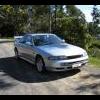Anybody Rebuilt An Rb25det Themselves?
Announcements
-
Similar Content
-
Latest Posts
-
Yeah - that's not true. Larger turbos flow more at the same boost. By definition. I've always found it funny when the claim of same flow same power because same boost is made. The turbine is larger, therefore will put up a lower restriction to flow at any given flow, cf the stock one. Hence, you need less boost to make the same flow through the whole system. Hence, when you have the same boost as before, you must have more flow. -5s are a pretty decent bit bigger than stock.
-
By joshuaho96 · Posted
That's basically how I've been driving my R33 for a while now. GTIII-SS running wastegate boost. It makes no more power than stock because the turbos aren't flowing any more air than stock. Eventually though I need to fix this so it can actually drive as it should. -
By Dose Pipe Sutututu · Posted
If this was my own car, I would pull about 5 degrees off the CAS, run a wideband, and if that seems ok, send it. -
By joshuaho96 · Posted
Run a 7 psi wastegate and wastegate boost and it might be ok on the stock ECU. Basically you cannot run past the last load cell by a significant margin.
-




Recommended Posts
Create an account or sign in to comment
You need to be a member in order to leave a comment
Create an account
Sign up for a new account in our community. It's easy!
Register a new accountSign in
Already have an account? Sign in here.
Sign In Now